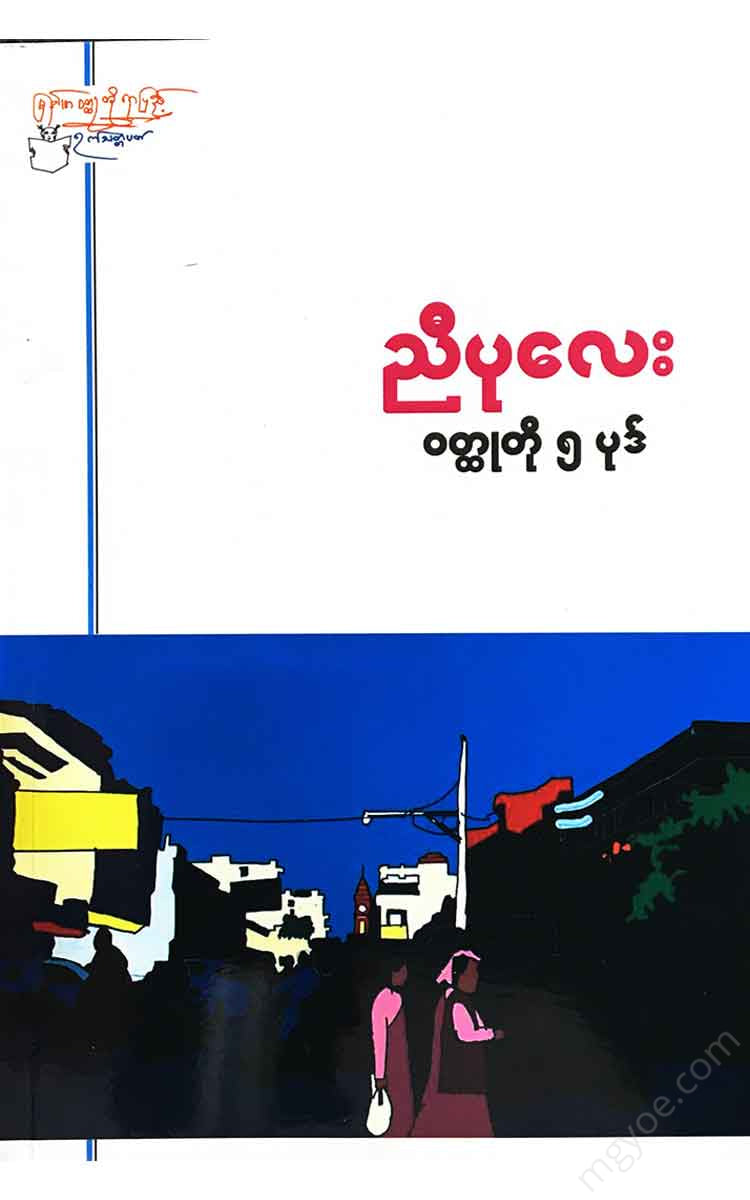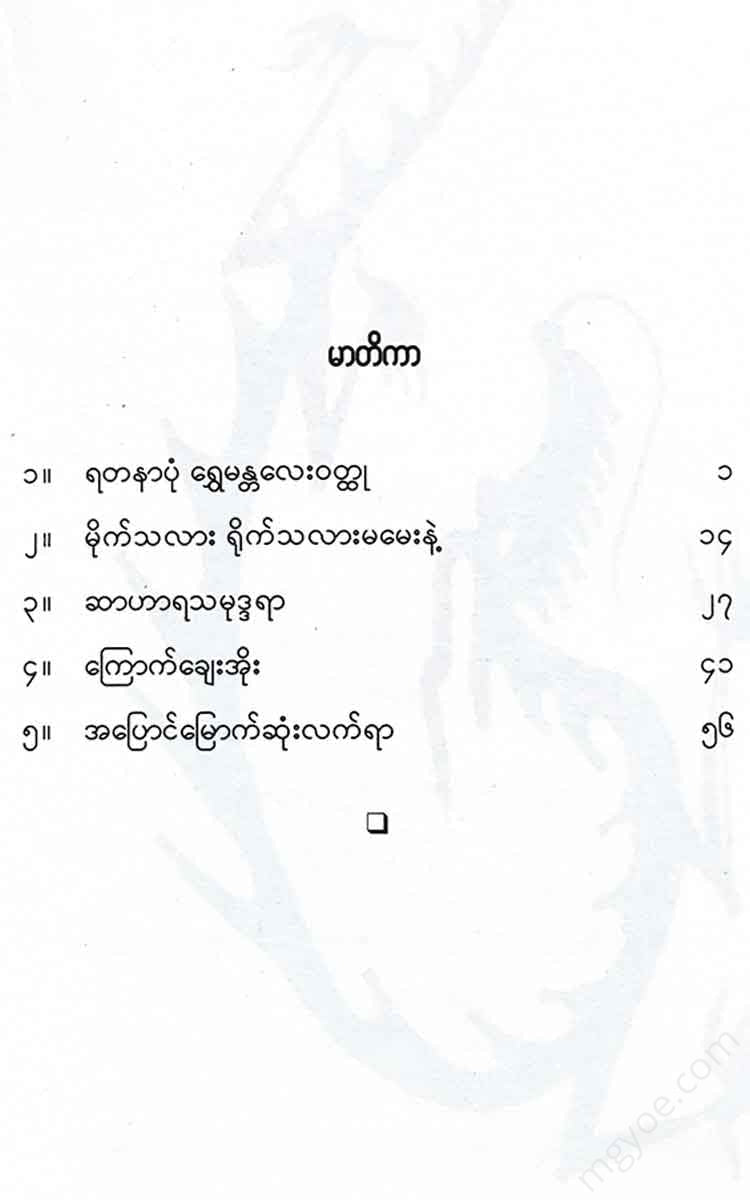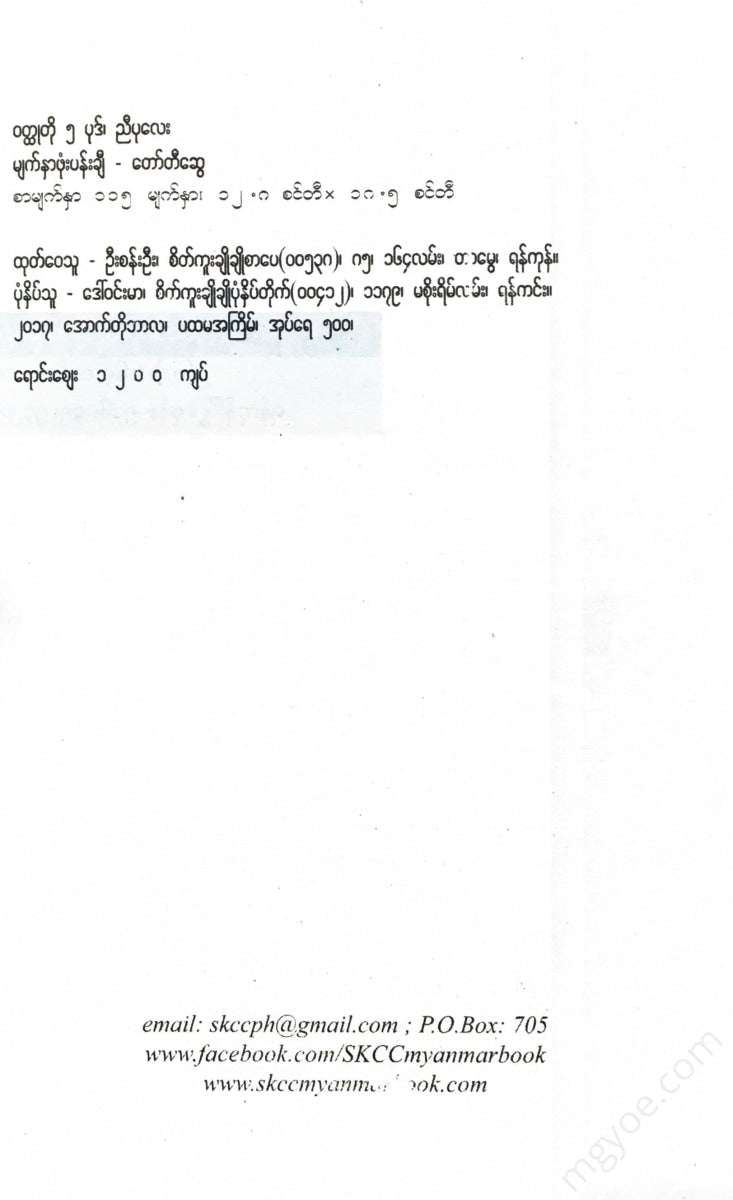စိတ်ကူးချိုချိုစာပေ
Nyi Pulay - 5 short stories
Nyi Pulay - 5 short stories
Couldn't load pickup availability
The Golden Mandala, a novel about the jewels
"He..."
"Oh, sir..." the voice of the monk Sishin.
The last sentence was harsher than the first.
"God..." I quickly replied. "Come quickly... The sun is high, I've been waiting for you every morning."
In front of the monastery, there were monks lined up under the tamarisk tree to receive alms. Sunanda was rude and didn't invite me. I was scolded because he had already gone to the monks' place and was showing everyone around.
I carefully put on my white linen robe and looked for the small copper rod and mace in my hand on the altar. I found only the mace and I didn't know where the copper rod was. Had the students taken it the night before and not put it back in its place? Did Sunanda want to "trick" me? I searched carefully and found it under the bed at the foot of the bed. This was someone's hand. I thought it was Sunanda's hand. Sunanda was always rude to me like this.
Like every day. When I arrived under the tama tree, the five monks had already put on their robes and were standing in a row, each with their hands clasped in their hands. The abbot looked at me without saying anything. Behind this look, there was a whole series of meanings. He looked at me with a stick, if you are late like this in the next few days, I will punish you. It was a look of reprimand, a look of reprimand.
The monks seemed to be enjoying the way I was being scolded and looked at. The monks smiled, and Venerable Sunanda smiled with great satisfaction. After a while, the monk said:
"Now, come...come"
Even though the monk spoke simply, I felt like there was a little bit of my own voice in my heart.
The little winds of the dawn of the new moon are running here and there. These little winds carry the sound of the clock tower of the monastery, "It's five o'clock."
As we reached the north gate of the monastery, the five o'clock chime stopped. So, why were we late? As usual, we were on time.
As we exited the north gate, Sunanda was about to play the brass drum as usual...
“Adis, play the cymbal.” The monk said in a loud voice, without listening. Thut Thunanda is just a fool, a long-winded, and a cunning man. He is deliberately targeting me, I know. I immediately turned around and looked at him, “Look at him.” I scolded him and played the cymbal loudly, and the sound of the cymbal spread throughout the Wai Wai Lwin Lwin and Aung Dhu Wan neighborhoods. In my mind, I remembered Thunanda. I didn’t want to tell the monk that he was secretly reading novels and cartoons. What can I say, like a thief? I will definitely put this guy on a horse-drawn carriage and send him back to the village.
Aung Du Wan Ward is also full of huts and houses where there are many artisans. There are two old one-story houses next to each other. The owners of the houses next to each other also don’t usually give alms. I can’t say where they go to make donations. “Arawong Traditional Medicine Shop” on the south side of Am Mae Road is where the teacher Daw Sein Oo gives alms. Yes, sir. Today is Tuesday, the teacher’s birthday. And the blacksmith also gives alms. Today is the only time in Aung Du Wan Ward that they give alms. Teacher Daw Sein Oo usually gives a spoonful of alms to Thu Thu Nanda for me. Some of the monks and nuns don’t consider me a person who plays the brass drum like me.
When we got to school, we had to eat together at the same table, but sometimes I still wanted to carry the kyat like Thu Taw Sunanda. Thu Taw Sunanda owned the kyat. He didn't give me a turn. Who would want to play the brass drum every day? The brass drum is light. The longer the kyat is played, the more it gets worn out and the more it wears out. But when a dog barks in the village, isn't it the one who is the first to bark at the brass drum player? U Zin Pyone Nyo said that people who play the brass drum can become gods with good voices in the next life. If what U Zin Pyone Nyo said comes true, it won't be bad.
We passed Aung Dhu Wan and arrived at the banana plantation. These plantations don't often offer alms. They offer them once every ten days. The uncle in the middle plantation is very special. They only offer alms once a year, in the early part of July. Don't look at the calendar on that day. It's a day of mourning for the whole country. The stok thak hen offers red alms. Right now, the bowls in the bowl are still empty.
We passed the banana plantation and stopped for a while at the northwest corner of Mya Taung Monastery. The monks from Dahatta, Shan, and Mone Ti Su to the east of our monastery, who were going to receive alms from the Dakha and Dakha women, and who were going to go to the city with us to receive alms, gathered here. The monks who had gone out with us when we left the monastery, the Dey Wun and Go Wein monks, who were going to receive alms from the Daw Wun and Go Wein, also separated from here and headed west.
After a while, the monk said, "Your Excellency, Adis."
There is no need to say anything else. I will play the copper drum. It is a symbol that I will continue to receive alms.
Our group of monks is now quite small. First up is me, then Sunanda, then the Sayadaw, then the U Pansin, and finally, Korin Baddiya, Korin Jotika, and Shin Paduma...
In the Malun neighborhood, we used to go to the neighborhoods of Malun, Malun Put, Malun Onion, and Malun Chin. Malun is a Buddhist Burmese neighborhood where there are many traders. The old woman at the corner market was pouring alms. Since the market lady was old, I would often play the copper drum loudly when I got to the market. The old woman was a little deaf. The market lady's alms were white and often steamed. The alms were also fragrant.
Today, the bean paste that started to take its place in the dishes was poured by the car wash lady. The way the bean paste was poured was very thick. There was only one thing to say about it: less oil. The highway car park poured fried rice. It is noteworthy that the eighth day of the waning moon of the month of Tabaung is the day when there are a lot of fried rice in the bowls. That day is the anniversary of the fire in the center of Mandalay. I think they are determined to overcome the disaster.
At the southern end of Malun Chintan, a house with a sign saying “Beware of Dogs” serves boiled beans. The boiled beans are made with a little oil. And the mother who sells tea and fried food in the market usually serves a bowl of rice and a bowl of rice. Today, she is serving chicken with bitter gourd. The monk likes it. Isn’t it said that the old man is good for the elderly?
From that house, we get more red rice. The house that sells water from a well on the corner of 33rd Street also has a rice dish with a rice dish of Nisabatta rice. Today, I am cooking fried rice. This lady seems to like fried rice very much. When the rice is in season, she often serves fried rice as a rice dish. It is fried with eggs and rice, ginger and garlic in the stomach. That is what we, the Baddiyas, like.
Before the Mandalay fire, we were burning alms and food. Many of our Nisabhat alms-givers' houses were destroyed in this fire. Now, only a few alms-givers remain. Some have moved to places with clean water. After the fire, some no longer give Nisabhat alms but give as they should. New alms-givers are also increasing. There are not as many as before. The fire that took out the heart of Mandalay. Is it a small fire? Now, even with a new heart, what will it cost? This is not a small loss. The people who were burned are struggling to rise from the ashes. That is why we know that they are not able to give alms. Otherwise, there would be Burmese people, a people who are not far from the hands of the alms-givers.
Some people also say, "The fire has spread, and people who used to live in one-story buildings now have two or three stories. People who used to live in two-story buildings now have three or four stories. This is a minority. Some are new people, people we didn't expect.
Khin Maung Win, who is breaking the law and is the most frequent customer of sour pork, cannot rebuild the building. Judging by the sign on his land that says “Investigation: Nyunt Wai San Tha, 32nd Street,” it seems that the land is about to be sold.
On special occasions, the Dakka Maggi, who would offer offerings of pork, pork trotters, and pickled leppan head, would take a deposit from the person who would be renting the house and build a house next door.
Share





